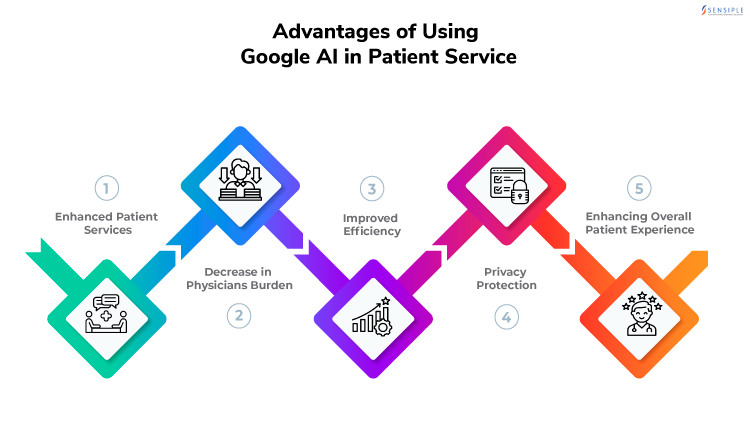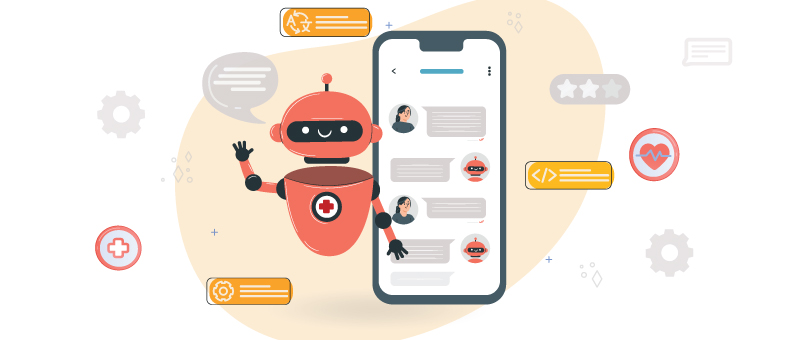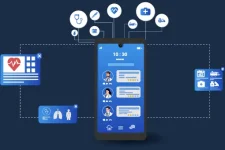In this massively transforming healthcare sector, Artificial intelligence (AI) plays a major role in developing their scalability. Google AI had significantly helped the healthcare organizations by providing various tools and services, which helps to provide more effective and responsive patient care Online services.
The healthcare industry has experienced significant growth in recent years by the introduction of new technologies and shifting patient expectations. Due to the increase in usage of patient portals and electronic health records, patients expect an on-time response from their healthcare providers. However, nowadays, the patient messages are gradually increasing causing fatigue among the doctors which results in a reduction in service quality. Here’s where google plays a vital role increasing the patient care Online services.
Improved Communication
- Communicating Individually with patients using Google’s Artificial Intelligence: AI chatbots provide 24-hour assistance.
- Simplifying Appointment Scheduling and Reminders: Setting reminders and booking appointments made easy with the help of AI assistance.
Enhancing Diagnosis and Treatment
- AI algorithms help patients to diagnose their issues quickly and effectively.
- Google AI provides auto-generated suggestions to improve patient care Online services.
- Effectively increase patient results using the Google AI tools.
Addressing Physician Burnout
Within the healthcare sector, physician burnout is a serious concern as research indicates that more than half of doctors experience it. Burnout is often caused by an excessive amount of administrative work, which includes answering messages from patients. The average doctor receives more than 200 messages a week, making it difficult to meet the demand. This undermines the standard of care they deliver and impacts on their well-being.
Effects of Doctor’s Burnout
When doctors experience burnout, it impacts both patients and their healthcare providers. Some effects of experiencing medical burnout are listed below;
- Decrease in Patient Satisfaction: Doctors who suffer from burnout are more likely to provide hurried and impersonal treatment, affecting the patient’s happiness.
- Medical Errors: Burnout are most likely to increase medical mistakes, which can cause terrible effects for patients.
- Decrease in Productivity: Burnout leads to longer waiting time and delay in patient diagnosis which reduces productivity.
- Increased Turnover: Burnout can contribute to higher turnover rates, which might lead to loss of skilled healthcare professionals.
Google AI: Enhancing Patient Responsiveness and Care
Google AI has the ability to provide collaborative tool for doctors which handles the patient’s messages to create compassionate and individual responses. The integration of Google AI with EHR system allows healthcare providers to utilize the potential of generative AI.
- Reduce Cognitive Load
Google AI helps doctors overcome “writers block” by providing compassionate drafts, allowing them to focus more on complicative aspects of patients. This helps doctors in reducing their mental stress and offers improved patient care Online services.
- Enhanced Response Quality
Patients expect to receive a high standard of care and attention when they communicate with their healthcare providers. However, with the increase in number of patient messages day-by-day, doctors may find it difficult to provide an individual and compassionate response promptly. This may lead to a decrease in patient satisfaction and terrible health outcomes.
This is where Google AI comes into action. Google AI helps to provide a quality response which is more proper and compassionate. The AI system is well trained with an extensive collection of various datasets containing interactions between patients and doctors, helping it to understand the complexities of human communication. This allows the AI system to analyze the patient’s messages and provide relevant responses based on their concerns, including important medical details.
By providing more compassionate and individualized care, patient satisfaction increases. Patient might feel more connected with their healthcare providers and are more responsive in getting their own treatment. Overall, Google AI can help healthcare partners provide enhanced services, resulting in better healthcare and patient satisfaction.
Functions of Google AI
Using natural language processing (NLP) and machine learning tools, Google AI analyzes and responds to patient messages. Here’s how it operates:
- Analyzing Patient Messages: AI algorithms analyze the patient messages and provide data to the healthcare providers by identifying the key concerns, making it easier to for doctors to provide necessary treatment for the patient.
- Provide Actual Medical Information: The AI system provides accurate medical information about patients, helping the physicians to provide personalized treatment that meets patient’s expectations.
- Ensuring Reliability: Doctors carefully examine and edit the AI generated responses to ensure that they meet the standard medical protocols, enhancing reliability and helps to enhance communication quality with the patients.
Advantages of Using Google AI in Patient Online Services

- Improved Patient Satisfaction: Personalized care improves patient satisfaction, leads to better health outcomes and strengthens their trust. This helps healthcare providers in forming better relationships with their patients and improve the level of care provided.
- Decrease in Physicians Burden: By lowering the administrative tasks, doctors can focus on handling complex and high-risk treatments without any complications and help them improve their quality of treatment.
- Improved Efficiency: AI-driven patient messaging improves communication and reduces the time spent in responding to patient messages, helps doctors to attend to the patients more efficiently and attentively based on their needs.
- Privacy Protection: Protecting patient security is a major concern in healthcare services. Google AI prioritizes patient data privacy, employing strong encryption techniques to protect patient records and adhering to medical policies and standards such as HIPAA and GDPR. This ensures patient data is protected, helping healthcare providers build trust with their patients.
- Enhancing Overall Patient Experience: Google AI customizes patient experiences with AI-driven recommendations and feedback mechanisms to continuously improve patient Online services, creating a seamless and integrated healthcare journey.
Transforming Healthcare with Sensiple’s AI Solutions
Google AI offers numerous benefits for improving patient online services, emphasizing the importance of responsiveness in modern healthcare. With the upcoming developments in AI technology, the future of medical industry looks very promising. Leveraging Google AI to provide personalized, efficient, and secure interactions can revolutionize healthcare delivery, leading to better patient outcomes and satisfaction. By embracing these advancements, healthcare providers can embark on a transformational journey towards enhanced patient care ensuring a higher quality of service and a more connected patient-provider relationship.
Connect with Sensiple to unlock the full power of AI in the healthcare business. By leveraging Sensiple’s innovative AI solutions, healthcare providers can improve their patient care, minimize the administrative burdens, and stay ahead in the healthcare market.
Are you ready to transform your patient care Online services with Google AI? Connect with Sensiple – Revolutionize the Healthcare Industry using AI.
About the Author:
 Balaji Narayanan,Junior Developer at Sensiple, brings 2.2 years of specialized experience in IVR solutions. Has a strong command of JavaScript and Node.js, and has effectively handled various projects involving Intrado, Mosaic X, Twilio, Google Cloud Platform (GCP), Amazon Web Services (AWS), Contact Center Services, and West utilities.
Balaji Narayanan,Junior Developer at Sensiple, brings 2.2 years of specialized experience in IVR solutions. Has a strong command of JavaScript and Node.js, and has effectively handled various projects involving Intrado, Mosaic X, Twilio, Google Cloud Platform (GCP), Amazon Web Services (AWS), Contact Center Services, and West utilities.



 (4 votes, average: 4.00 out of 5)
(4 votes, average: 4.00 out of 5)



